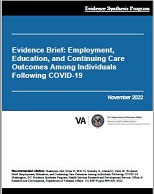
|
Recommended citation: |
Download PDF: Brief, Supplemental Materials
A history of COVID-19 (2020 to early 2021) was associated with negative impacts on employment and post-hospitalization continuing care needs with insufficient evidence on education outcomes. Effects varied widely but appeared to be associated with disease severity and symptom persistence. Future research is needed to study the long-term effects of COVID-19 for individuals infected with SARS-CoV-2 early in the pandemic (pre-2021) and more recently, given the rapidly changing medical, public health, and societal landscape.
As of October, 2022, there have been over 97 million reported cases of COVID-19 in the US and over 781,000 among US Veterans. The burden of COVID-19 remains unclear. After recovery from acute infection, some individuals may have difficulty completing daily activities, including work or secondary education, due to ongoing symptoms. Recovery from infection may also result in higher healthcare needs including greater dependence on both formal and informal care partners.
Return to work and inability to work due to illness following COVID-19 varied widely and were likely associated with disease severity, symptom persistence, and time post-infection. Employment outcomes were worse for ICU compared to non-ICU hospitalized patients and best for non-hospitalized patients. Information was insufficient to determine the effect of COVID-19 on post-secondary education. Continuing care needs studies focused on discharge disposition for adults hospitalized for COVID-19. Limited data suggested ICU survivors were more likely to be discharged to a skilled nursing facility or equivalent and less likely to be discharged home than non-ICU survivors. Results ranged widely, few studies had comparators, and most did not report health complications during hospitalization, discharge health status, or pre-COVID-19 care needs. Most studies occurred prior to the Delta and Omicron variants, vaccine availability, and currently available treatments. Changes have also occurred in public health recommendations and employment and education policies.
Evidence Brief: Employment, Education, and Continuing Care Outcomes among Individuals Following COVID-19 (Management eBrief)